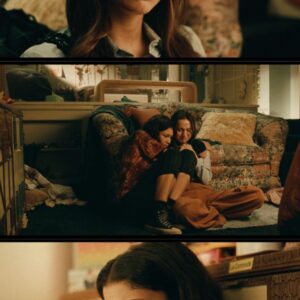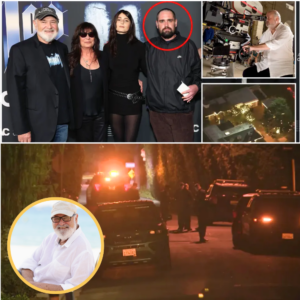In the enchanted corridors of Hogwarts, where spells weave destinies and friendships forge unbreakable bonds, the line between mentor and mentee has always blurred into something profoundly personal. J.K. Rowling, the reclusive Scottish sorceress who conjured a billion-dollar empire from ink-stained notebooks in Edinburgh cafes, once cradled a trio of child actors like fledglings in her nest. Among them, Emma Watson—wide-eyed Hermione Granger, the bushy-haired brainiac whose unyielding pursuit of justice mirrored the author’s own fierce intellect—held a special place. Rowling penned letters of encouragement, doled out life advice over tea, and watched as Watson blossomed from a 9-year-old Oxfordshire schoolgirl into a global icon, her bushy brows furrowed not just in fictional fury but in real-world advocacy. “You are a force, Emma,” Rowling once wrote in a missive that Watson has cherished as a talisman. Yet, on September 29, 2025, that bond shattered like a Vanishing Cabinet under the weight of irreconcilable convictions. In a blistering X thread that amassed over 40 million views in 24 hours, Rowling eviscerated Watson, branding her “ignorant of how ignorant she is” and lamenting, “I wasn’t a multimillionaire at 14.” The salvo, a raw dissection of privilege, betrayal, and the erosion of women’s rights, has reignited the Harry Potter schism, pitting the creator against her most vocal creation in a spectacle as tragic as it is tabloid gold.
The rift, simmering since 2020 like a poorly brewed Polyjuice Potion, traces its toxic origins to Rowling’s essay “TERF Wars,” a 3,600-word manifesto that exploded across the internet like a rogue Bludger. Penned in the shadow of her own survival from domestic abuse and sexual assault, the piece argued for the sanctity of sex-based rights, decrying what she saw as the erasure of biological women’s realities in the name of gender identity ideology. “I’ve lived as a woman for decades,” she wrote, her words a clarion call for single-sex spaces—from prisons to bathrooms—that she believed were under siege. The backlash was swift and sorcerous: death threats flooded her inbox, paparazzi swarmed her fortified Edinburgh home, and her once-unassailable status as the architect of childhood wonder crumbled into accusations of bigotry. Enter Watson, then 30 and riding high as a UN Women Goodwill Ambassador, who fired off a tweet that felt like a Stunning Spell: “Trans people are who they say they are and deserve to live their lives without being constantly questioned or told they aren’t who they say they are.” It was a sentiment echoed by co-stars Daniel Radcliffe (“Transgender women are women”) and Rupert Grint (“Trans is who they say they are and deserve to live their lives without being constantly questioned or told they aren’t who they say they are”), fracturing the golden trio into ideological adversaries.
For Rowling, the sting was personal. These weren’t distant critics; they were the children she’d nurtured through the grueling shoots of eight blockbuster films that grossed $7.7 billion and enchanted 500 million readers worldwide. The Harry Potter saga, born from Rowling’s pen during her impoverished days as a single mother on welfare—scribbling Philosopher’s Stone on napkins in a leaky Portobello flat—had lifted Watson from obscurity to a $85 million fortune by age 20. Rowling had been there at the premieres, the wrap parties, the quiet moments when Watson confided her fears of typecasting. “Jo was like a surrogate mother,” Watson later reflected in a 2011 Oprah interview, her voice thick with gratitude. But as the trans rights debate engulfed the franchise—boycotts of the upcoming HBO reboot, fan campaigns to “cancel” Rowling’s executive producer credit—the author’s protectiveness curdled into resentment. By March 2025, responding to a viral X query about actors who “ruin movies,” Rowling alluded to her erstwhile charges: “Celebs who cosied up to a movement intent on eroding women’s hard-won rights.” The barb landed like a Sectumsempra curse, drawing rebukes from Ralph Fiennes (Voldemort himself) who decried the “verbal abuse” hurled at her, and Helena Bonham Carter, who lamented the “extreme judgmentalism.”
Watson’s olive branch arrived unexpectedly on September 24, 2025, during a vulnerable episode of Jay Shetty’s “On Purpose” podcast, recorded in a sun-dappled Los Angeles studio overlooking the Pacific. At 35, Watson—now a part-time producer on indie darlings like Little Women (2019) and a vocal feminist through her HeForShe campaign—has largely retreated from the spotlight, trading red carpets for quiet activism and a low-key life in London’s Notting Hill with businessman Leo Robinton. Dressed in a simple white blouse that evoked Hermione’s school robes, she leaned into the microphone, her brown eyes misting as Shetty probed the Rowling rift. “I treasure Jo—the person I knew, the kindness she showed me,” Watson said, her voice a measured melody of regret and resolve. “There’s no world where I could cancel her out for anything. I hope people who disagree with my opinions can still love me, and I hope I can keep loving those I don’t align with.” She lamented the lost chance for dialogue: “I’m most upset that a conversation was never possible.” It was a poignant plea for nuance in a polarized age, harking back to the podcast’s ethos of mindfulness and empathy. Fans lauded it as mature grace; #HermioneHeals trended with 1.2 million posts, clips splicing Watson’s words with Granger’s impassioned SPEW speeches for house-elf rights.
Rowling’s response, posted the next evening from her Edinburgh study—surrounded by first-edition galleys and a cat named after a Tolkien elf—was anything but conciliatory. The 1,200-word thread, timestamped 9:54 p.m. GMT, unfurled like a venomous vine, weaving affection’s ashes into a tapestry of accusation. “I’m not owed eternal agreement from any actor who once played a character I created,” she began, her tone a steely incantation. But the barbs sharpened: Watson and Radcliffe, she claimed, wielded their Potter pedigree as a “particular right—nay, obligation—to critique me publicly,” positioning themselves as “de facto spokespeople for the world I created.” Rowling recounted a “turning point” in 2022: Watson’s BAFTA speech, where she declared solidarity “for all the witches”—a pointed elision that Rowling interpreted as exclusion. The real dagger? A handwritten note Watson allegedly passed via intermediary during Rowling’s darkest hour of threats: “I’m so sorry for what you’re going through.” Rowling, who has Watson’s number, seethed at the hypocrisy: “Emma had just publicly poured more petrol on the flames, yet thought a one-line expression of concern would reassure me of her fundamental sympathy.”
The thread’s crescendo was a gut-punch to privilege. “Like other people who’ve never experienced adult life uncushioned by wealth and fame, Emma has so little experience of real life she’s ignorant of how ignorant she is,” Rowling wrote, evoking Socrates with a scalpel’s edge. She painted Watson’s world as a velvet cage: no need for homeless shelters, mixed-sex wards, or council pool changing rooms; a private bathroom guarded by security, far from the vulnerabilities Rowling champions for ordinary women. “I wasn’t a multimillionaire at fourteen. I lived in poverty while writing the book that made Emma famous. I therefore understand… what the trashing of women’s rights… means to women and girls without her privileges.” It was a raw reminder of Rowling’s own crucible: divorced at 30, battling depression (dubbing it her “Dementor”), penning the manuscript on benefits while her daughter slept in a pram nearby. Watson, by contrast, had tutors on set, a £1 million trust fund by 18, and a trajectory from child star to Oxford grad without the grit of ground-level survival.
The fallout has been a cauldron of chaos. X erupted in dueling hashtags: #StandWithJo surged with 2.8 million mentions, fans sharing Rowling’s thread alongside clips of her 2023 podcast “The Witch Trials of J.K. Rowling,” where she dissected the mob’s anatomy with forensic calm. Supporters like Toby Young, editor of The Spectator, hailed it as “a masterclass in measured fury,” while Scottish MP Joanna Cherry tweeted, “Jo’s speaking for every woman who’s ever felt erased.” Conversely, #TeamEmma boiled over with 1.9 million posts, Watson’s allies decrying the attack as “classist bullying.” Pedro Pascal, the Last of Us heartthrob, blasted Rowling as a “heinous loser” on Instagram Live, his Chilean fire amplifying the chorus. GLAAD issued a statement: “Rowling’s words weaponize poverty against progress—Watson’s advocacy saves lives.” Parody videos proliferated: one viral skit, viewed 5 million times, cast Watson as a pampered princess dismissing Rowling’s “muggle struggles” with a wave of her wand.
Watson’s camp has stayed silent, her reps issuing a terse “no comment” to Variety. Yet ripples lap at her empire: her production company, Unanimous, just greenlit a docuseries on feminist icons, and whispers suggest she’s eyeing a memoir to unpack the Potter pressure cooker. Radcliffe, ever the peacemaker, told The Guardian in July that the feud “makes me really sad,” but he’s channeled his energy into The Trevor Project, raising $10 million for LGBTQ+ youth. Grint, the affable Ron, struck a neutral chord in 2022, calling Rowling his “auntie” while affirming trans rights—though his X account remains dormant amid the din.
This clash transcends tabloid tattle; it’s a microcosm of the culture wars devouring the wizarding world. The Harry Potter franchise, once a beacon of unity, now fractures along fault lines of identity and ideology. Warner Bros., navigating the $25 billion behemoth, has distanced itself: the 2026 HBO reboot, helmed by Succession’s Francesca Gardiner, proceeds without Rowling’s input, casting calls emphasizing “diverse representation” that irk the author further. Fan conventions like LeakyCon 2025 in Orlando saw heated panels, with cosplayers donning “Witches for Women’s Rights” badges clashing with rainbow-cloaked allies. Merch sales dip 15% in the UK, per NPD Group, as boycotts bite.
At its core, Rowling’s retort is a lament for lost innocence—not just Watson’s, but the shared sorcery that birthed a phenomenon. “Adults can’t expect to cosy up to an activist movement that regularly calls for a friend’s assassination, then assert their right to the former friend’s love,” she concluded, her words a poignant hex. Watson, in her podcast vulnerability, embodied Hermione’s heart: fierce loyalty tempered by growth. Rowling, the eternal Dumbledore, wields wisdom forged in fire, her quill a sword against erasure. As September wanes into autumn’s chill, the wizarding rift endures—a spell unbound, its magic marred by muggle divides. Will reconciliation brew in some hidden alcove, or has Avada Kedavra claimed this kinship forever? In the end, perhaps the real curse is the one that turns family into foes, leaving only echoes in the Great Hall.

